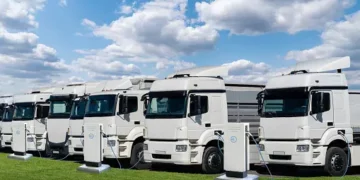The concept of sustainability is becoming increasingly relevant in the financial evaluation and public image of Fast-Moving Consumer Goods (FMCG) companies. This heightened focus is also seen in the push from shareholders and corporate leaders for more sustainable practices.
A critical aspect of logistics, the “last mile” delivery, is where products diverge from centralized shipping routes to numerous individual destinations. This differs from the earlier stages of delivery, where products are shipped in bulk to a single location. The last mile is a key contributor to logistics costs and carbon emissions due to the individualized nature of delivery.
Consider the process of delivering a product from China to London, which entails a journey of over 5,000 miles via air, rail, and road. Surprisingly, it is the final leg of this journey, from the distribution center to the consumer’s doorstep, that can incur significant costs and resource use, often more than the preceding thousands of miles of transport.
Transportation modes play a significant role in last-mile delivery, where internal combustion engine (ICE) vehicles are commonly used. The shift toward electric vehicles (EVs) is seen as a pivotal move for reducing carbon emissions. Although there is growing consumer interest in EVs in Europe, the commercial vehicle market has been slower to adopt them, often due to concerns such as range anxiety. Despite this, with most delivery routes being under 100 miles, the transition to EVs seems a feasible step toward sustainability.
Maersk, as a logistics partner, is participating in this shift by investing in small EV trucks for last-mile deliveries, including local deliveries and potentially for container shunting within warehouse areas. These investments are part of a broader initiative to reduce greenhouse gas emissions.
Beyond vehicles, there is a need for an infrastructure that supports EVs, including parking, charging, payment, and operating systems. The development of platforms that integrate these services could offer fleet operators more flexibility and efficiency in managing last-mile deliveries.
Warehouse sustainability is another facet of this discussion, where location and energy sourcing play significant roles. Warehouses utilizing renewable energy can significantly lower emissions, and on-site energy production can contribute to the local grid and broader energy conservation efforts.
Innovations such as automated lockers, click-and-collect points, and route optimization software can further reduce emissions. These smart delivery options, while sometimes deviating from direct-to-door delivery, provide alternatives that can limit unnecessary travel. The use of AI for analyzing driver routes and suggesting energy-efficient paths is another technological advance contributing to sustainability.
Comprehensive sustainability efforts require the integration of data across all supply chain facets. Tools like the Maersk Emissions Dashboard compile data from the entire supply chain, providing insights that can guide FMCG companies in making environmentally conscious decisions.
Collaboration remains essential, with stakeholders across the spectrum needing to align on sustainability goals. Maersk’s commitment to net-zero emissions by 2040 and its integration of B2C Europe for last-mile delivery expertise exemplify the collaborative efforts needed to advance these goals.
In conclusion, last-mile delivery, a crucial stage in the logistics chain, presents an opportunity for significant advancements in sustainability, with a range of strategies and innovations playing a role in this transformation.
Discover supply chain logistics news updates on The Supply Chain Report. Free international trade tools are available at ADAMftd.com.
#SustainableLogistics #LastMileDelivery #EVAdoption #CarbonReduction #LogisticsInnovation #GreenTransportation #WarehouseSustainability #SupplyChainOptimization #FMCGSustainability #EmissionsDashboard #MaerskNetZero #EcoFriendlyLogistics #ElectricVehicles #LogisticsInfrastructure #AIinLogistics #GreenSupplyChain #ClimateGoals #MaerskB2C















